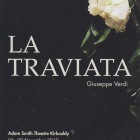Traviata 2019Fife Opera
Read more about the opera Traviata
Fife Opera staged La traviata twice in their early years, but the last of those was as long ago as 1993, so it was high time that the company took another look at one of Verdi's greatest works.
The production was given four performances, with the final Saturday, which we attended, being a matinee. Alistair Digges was in confident command of the orchestra, with tempi always well judged. The reduction of the score to chamber sized band by Tony Burke was used. Even so, the team of 28 players (18 strings) crowded into the compact pit of the Adam Smith Theatre.
On stage, most of the parts were double cast, the first group singing on Wednesday and Friday, with the second on Thursday and Saturday. Both tenors cast as Alfredo have recently been studying in Glasgow at the RCS, and David Lynn showed an excellent well-schooled tenor that coped well with this difficult role. He is also a useful actor, and appropriately youthful in demeanour. His father was played by two real veterans of the Scottish amateur operatic world, with George Nairne still able to give an effective performance. Neither man took their difficult second act cabalettas, though they did at least sing both verses of those arias.
The staging by Vanessa Codutti, a young Italian director, was in most respects traditional. The settings were simple and the costumes in the traditional mid-19th century period. There was one great novelty which was interesting to see. Not only did Violetta have two sopranos alternating, but the the role was split between two singers each evening, with four Violettas in all.
Thus we had one singer representing the young lady, with Laura Curran's sweet-toned soprano throwing off 'Sempre libera' and other flights with ease. Moira Docherty represented the sick Violetta employing the more dramatic voice required in the final act. In fact she and her alternate, Frances Taylor, both recently sang the complete role with Tayside, so this was clearly a directorial rather than musical decision. Violetta's bed was on stage throughout, usually occupied by her 'sick' self. There were occasions in the second act when she actually left the bed to act with her younger self, sometimes singing alternate phrases. At the end, as the sick heroine expired on the bed, her brief sensation of returning health was represented by the return of her younger colleague.
This was an interesting idea and quite enjoyable. However it is unlikely to catch on as the role is renowned for providing a great challenge to the soprano precisely because of the differing vocal requirements of each act. It was certainly worth seeing it, though.
Performance Cast
- Violetta Valéry a courtesan
-
Sara Nealley (Young; Nov 6, 8)
Laura Curran (Young; Nov 7, 9)
Frances Taylor (Sick; Nov 6, 8)
Moira Docherty (Sick; Nov 7, 9)
- Baron Douphol Violetta's protector, a rival of Alfredo
- Doctor Grenvil
- Flora Bervoix Violetta's friend
-
Katie Forrest (Nov 6, 8)
Amy Wallace (Nov 7, 9)
- Marquis d' Obigny
- Gaston Vicomte de Letorières, a man about town
-
Mathew Oliver (Nov 6, 8)
Brandon Low (Nov 7, 9)
- Alfredo Germont Gaston's friend
-
Connor James Smith (Nov 6, 8)
David Lynn (Nov 7, 9)
- Annina Violetta's maid
-
Héloïse Bernard (Nov 6, 8)
Anna Brady (Nov 7, 9)
- Giuseppe Violetta's servant
-
Michael Henderson (Nov 6, 8)
Stephen Devaney (Nov 7, 9)
- Giorgio Germont Alfredo's father
-
Ivor Klayman (Nov 6, 8)
George Nairne (Nov 7, 9)
- Servant in Flora's household
